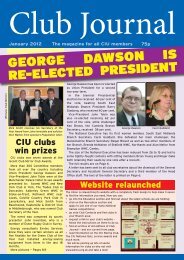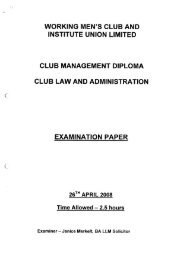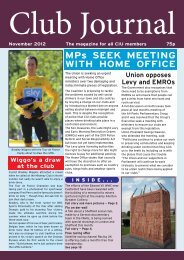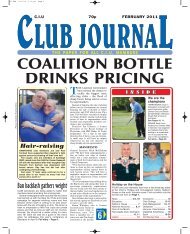Club
costs - CIU
costs - CIU
- No tags were found...
Create successful ePaper yourself
Turn your PDF publications into a flip-book with our unique Google optimized e-Paper software.
Fraud in a club<br />
Rumours are always flying around<br />
clubs about someone being on the<br />
take. Just occasionally they’re true<br />
and for that reason it is imperative for<br />
every club to have systems in place<br />
that both protect the innocent and<br />
deter or find very quickly the guilty.<br />
The following is a brief summary of some<br />
of the major aspects of what is known<br />
as “internal control”; this will safeguard<br />
every club and enhance the reputation<br />
of management and staff among all club<br />
members.<br />
CONTROLLING YOUR CASH<br />
1. Cash in the hands of the Steward<br />
Every month, at irregular times and without<br />
giving any warning to the Steward, his/<br />
her cash should be counted by at least<br />
two members of the Committee. A basic<br />
essential is that all the cash should be taken<br />
into one room and counted in the presence<br />
of the Steward.<br />
Make sure the Steward has been to the toilet<br />
if necessary before counting starts as one<br />
moment’s absence invalidates the count.<br />
(If short the Committee members could be<br />
accused of taking the cash.)<br />
The details of the count should be scheduled<br />
and signed by the Steward and Committee<br />
members present. They should be reported<br />
to the main Committee and minuted as such<br />
together with the Committee’s decision as<br />
to any action required.<br />
2. Cash in machines with registers<br />
All machines under the control of the club<br />
should be emptied weekly. (Some machines<br />
are emptied by the suppliers and may be<br />
done at different intervals.) The cash should<br />
be reconciled with what should be in the<br />
machines according to the registers. The<br />
details should be recorded in a permanent<br />
record book showing the theoretical as<br />
well as the actual cash and this should<br />
be presented to the whole Committee to<br />
consider.<br />
• Revenue & Customs also have an interest<br />
in these records where they concern B4 and<br />
other classes of machines subject to tax. If<br />
there is no reconciliation to meter readings<br />
they can raise an enforceable assessment<br />
and make the club pay.<br />
3. Cash for tickets sold<br />
Whether it be raffles, bingo, mini-tote,<br />
concert tickets or any other such items, it<br />
<strong>Club</strong><br />
Journal<br />
Official Journal<br />
of the CIU<br />
253-254 Upper Street,<br />
LONDON N1 1RY.<br />
Telephone: 020 7226 0221<br />
Fax: 020 7354 1847<br />
Email: info@wmciu.org<br />
Website: www.wmciu.org.uk<br />
Personal subscriptions:<br />
£7.50 per year<br />
Editor:<br />
Ken Roberts<br />
Prevention by internal<br />
control is the best cure<br />
South East<br />
Midlands Branch<br />
President<br />
BARRY<br />
SLASBERG<br />
continues our<br />
series on fraud<br />
with a look at<br />
prevention.<br />
should always be possible to confirm what<br />
cash should be paid over to the Committee<br />
each week by reference to the starting<br />
numbers and finishing numbers of the<br />
tickets for each event. Again, the details<br />
should be recorded in a permanent book for<br />
the Committee.<br />
4. Members’ subscriptions<br />
After every session the amount of cash<br />
should be reconciled with the value of<br />
receipts issued for each session. Receipt<br />
books can be obtained from Branch<br />
offices. The reconciliation prepared by<br />
the Secretary/Treasurer should be double<br />
checked by a member of the finance<br />
committee and discrepancies reported to<br />
the main Committee.<br />
5. Other cash receipts<br />
It is always best to have a rota of Committee<br />
members to empty smaller machines, such<br />
as snooker meters. These are not high risk<br />
areas and it is inevitable that there will be<br />
minor errors from time to time. Such errors<br />
can be disregarded as a Committee member<br />
tearing around the club selling raffle tickets<br />
can be forgiven tearing off two strips instead<br />
of one or dropping the odd pound coin on the<br />
floor. Management should not waste time<br />
here but should be looking for patterns and<br />
considering major deficits.<br />
CONTROLLING YOUR PAYMENTS<br />
1. Wages<br />
The Committee alone is responsible for<br />
staffing levels in the club. It should ensure<br />
time sheets provided are within those agreed<br />
guidelines, unless alterations are previously<br />
Editorial Office:<br />
Powdene Publicity, Unit 17,<br />
St Peter’s Wharf,<br />
NEWCASTLE NE6 1TZ.<br />
Telephone: 0191 265 0040<br />
Fax: 0191 275 2609<br />
News: Chris Brewis<br />
Email: cj@powdene.com<br />
Advertising: Mike Lyon<br />
Email: info@powdene.com<br />
Tel: 0191 488 7142<br />
sanctioned and should also ensure that<br />
if Mickey and Minnie Mouse are on the<br />
payroll they are who they say they are. The<br />
Committee should also check to make sure<br />
the payroll is calculated in accordance with<br />
the time sheets.<br />
2. Suppliers<br />
The Secretary or Treasurer will most<br />
probably prepare payments for suppliers<br />
of both goods and services. They should be<br />
checked by that person for both delivery<br />
and price. All payments must be confirmed<br />
by the Committee (either finance or general)<br />
who should have before them the originals<br />
of all invoices and delivery notes where<br />
appropriate.. Cash payments should be kept<br />
to an absolute minimum and should always<br />
be backed up by a legitimate bill or receipt<br />
signed by the recipient.<br />
CONTROLLING YOUR STOCK<br />
Many clubs experiencing hard times and<br />
looking to cut costs do so by cutting out<br />
professional stock gaugers. This is a false<br />
economy. A regular professional stock check<br />
is of paramount importance. It highlights any<br />
deficiencies in the cellar and also protects<br />
the security and reputation of a good<br />
steward.<br />
CONTROL YOUR FINANCES<br />
The full Committee should be presented at<br />
every meeting with a full report of every<br />
transaction that has taken place since the<br />
previous meeting. This should show all<br />
payments and receipts to and from whatever<br />
source. These should be tied into movements<br />
on however many bank accounts the club<br />
has and there should be a reconciliation<br />
between the book balance of every bank<br />
account and the actual balance on the bank<br />
statement. For regularly used accounts it is<br />
usual for there to be a difference, but the<br />
difference should always have a valid reason.<br />
For instance, a bank deposit made through a<br />
carrier may take a few days to appear on a<br />
bank statement or a cheque sent may take<br />
some time to be presented.<br />
All of the above and other areas are<br />
covered in more detail in the CIU’s own <strong>Club</strong><br />
Management Diploma. Every Committee<br />
member can do themselves nothing but<br />
good by enrolling so they can take on the job<br />
with confidence and enjoy the experience.<br />
Tightly controlling the finances will<br />
not stop the odd one-off event like the<br />
disappearance of a week’s takings or a major<br />
stock deficit caused fraudulently. Details<br />
of every identified deficit should, however,<br />
be made available to the Committee for its<br />
consideration in timely fashion.<br />
<strong>Club</strong> Journal February 2013 7











